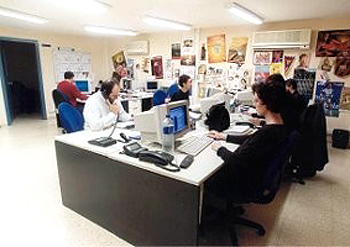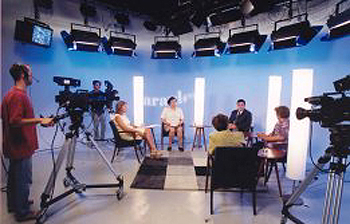
| Sociolingüística catalana |
The current legal framework of
language promotion in Catalan local TV, |
||||
| CONTINUA |
|
The General Plan for Language Policy establishes the goals, directives, actions and forecasts of results relating to language policy processes for the period 1994-2004. Chapter IV, section 3, states the goals and actions regarding the mass media and cultural industries. The specific goals for radio and television are those drafted in points 325 and 326. None of these goals and actions deal with the quality of the language. The "Oxygen of Language" makes clear to some extent that there are several different approaches to the concept of language policy and therefore to the role that mass media in general and local medias in particular must have within this process. The Philological Section of the Institute of Catalan Studies has also given its own opinion on language promotion and linguistic normalisation, whether in terms of quotas, or - of full extension of social use regarding both extent and quality. 4.2. The process of language promotion in the media: the role of the standard language The Philological Section of the Institute of Catalan Studies http://www.iec.es/inici.htm approved on September 21, 1990, the statement entitled The Catalan language and the mass media. The statement begins with the defence of a common and legitimized variety of the Catalan language, i.e. the standard language, which allows the unity of Catalan language.
In the third point of the declaration it is explained that when the time came to establish a policy of language promotion — a policy which, it states, obviously has to entrust the chiefs of mass communications media and the educators with an important role in the process — there was an outbreak, for what are described as non-scientific reasons, of particularist tendencies and urges to simplify regarding the language question, which consequently led to an acceleration in the process of language replacement. In keeping with the general spirit of the declaration, the Philological Section articulates a concept of linguistic normalisation which is strictly linked to the diffusion of the standard language and the extension of its use, that is to say, a language quality model. As well as attributing the mass communications media a very relevant role in its diffusion. On the other hand, the Philological Section declarations do not clear any of the institutions, organisations and groups involved in the process of linguistic normalisation of their share of responsibility. In fact at the end of point 7 it states: «Tots els qui han assumit alguna responsabilitat en les tasques de desenvolupament i de normalització de la llengua s’han de sentir, doncs, interpel·lats per aquesta realitat i han d’obrar en conseqüència». (17)
|

